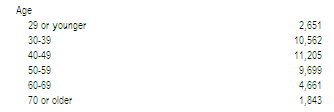Looking through Obama's web site for his program for the middle class, I found this claim (after clicking out of what for me was the premature video plea to join him):
[O]ur share of twenty-four-year-olds with college degrees now falls somewhere between Bulgaria and Costa Rica.Really? I found this surprising. Since the GI Bill, the U.S. has democratized college attendance. For decades, we have led the world in percentage of college graduates in every rising age cohort. When did it change? What's his source?
Unlike John Edwards's campaign site, Obama's doesn't have any citations at all. Alas, what I thought were my exceptional Google skills haven't found a satisfactory answer. I did find three items that bear on this:
- Remarks (pdf - see p. 7) from Austan Goolsbee, a Chicago School of Business economist, that appear to be Obama's source (and make clear that Obama's "somewhere" is needlessly vague)
- NSF statistics from 2003 about college grads in the workforce, particularly this part of Table 4:
- A very old (1990) article that incidentally provides stats about the annual cohort of graduates

The graduation rate of a million per year means that there should be between 5 and 7 million graduates 29 or younger. This assumes that most people graduate before age 30 and that the vast majority of graduates are citizens, but those seem like pretty safe assumptions. Where are the missing grads, then?
It is true that these age cohorts have increased in size without a corresponding college building boom. In percentage terms, of course this matters.
But, unfortunately, to really understand this and its public policy implications, I need more information. Any reporter out there want to ask the Obama campaign or Goolsbee? Nah, didn't think so.
Update: Found the missing grads! The NSF, inexplicably, wasn't looking for them! The survey was designed to look for graduates whose degrees had been granted more than three years before.
I'd still like to see the full international table of degree rates.
Update: Anonymous "goolsbee" provides the goods.
4 comments:
academics share the source code--all you have to do is ask.
% degree for 24 years olds as share of population
Bulgaria 35.2
US 33.9
Costa Rica 33.3
http://www.nsf.gov/statistics/seind06/append/c2/at02-37.xls
Goolsbee
Thanks! If only journalists were so forthcoming.
Very interesting and concerning, I agree.
Another question (of course): Is there any variation in the picture in other age cohorts? Not that we'll catch Latvia, but do Americans graduate earlier or later on average?
How did the other countries do it? Did they build lots of new universities or expand classes? Or both?
Oh, and a bunch more questions, I'm sure...
several key points in your question there:
1) our older cohorts were much better educated than other countries' were--so if you looked at this measure of 24 year olds in, say 1965 or 1985 we would likely have been solidly #1.
2) It's not that we got dumber, it's that everyone else copied us--invested in education $, built universities, expanded the pool
3) We still have the highest START rate of college but have by far the highest drop-out rate from college, too. Experts argue about the cuases but the two main culprits vying for attention seem to be a) cost of college is so high in the U.S. so people drop out because they don't want too many loans and b) our kids are getting to college unprepared in high school and have trouble getting through the classes and drop out. I don't know which is thought to be more important but strengthening high school and making college affordable strike me as pretty important. I am sure you agree.
Post a Comment